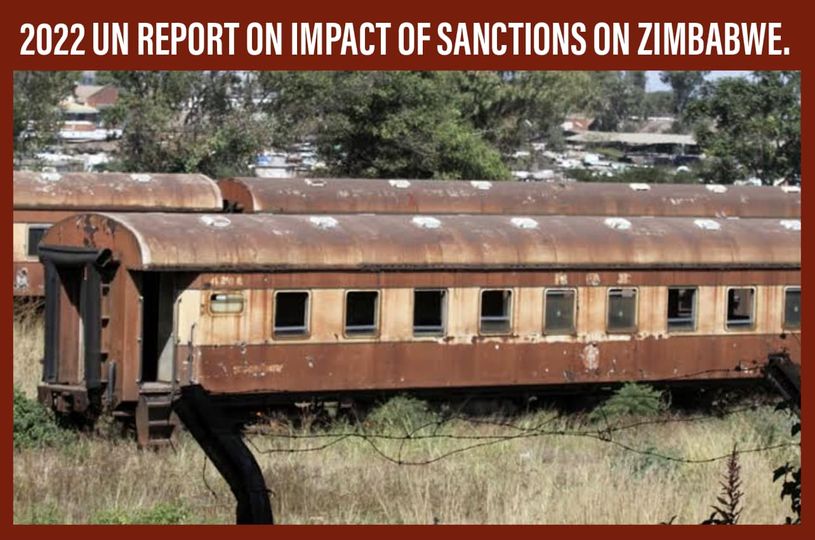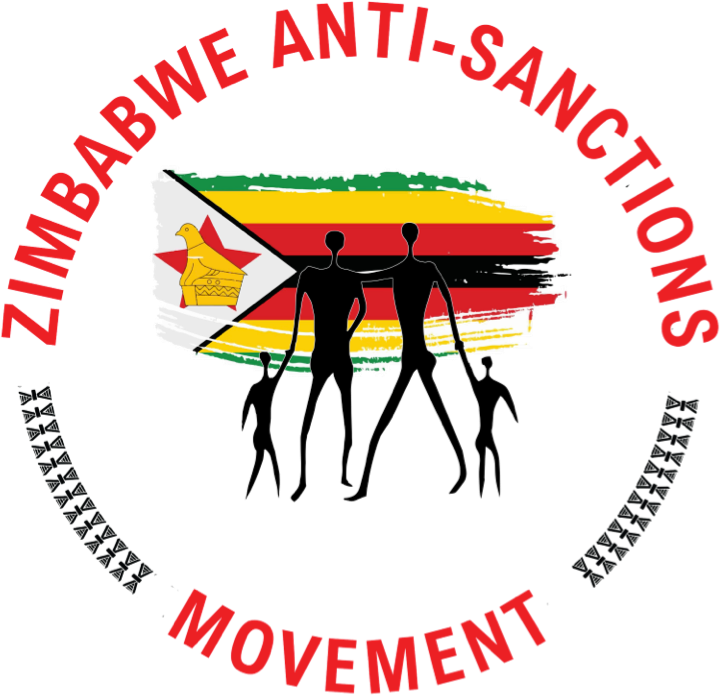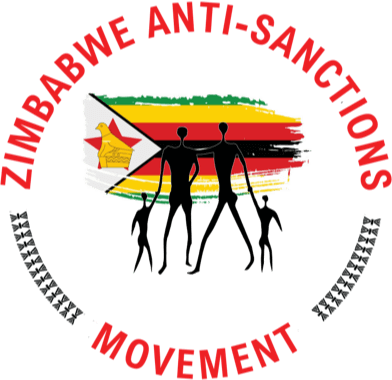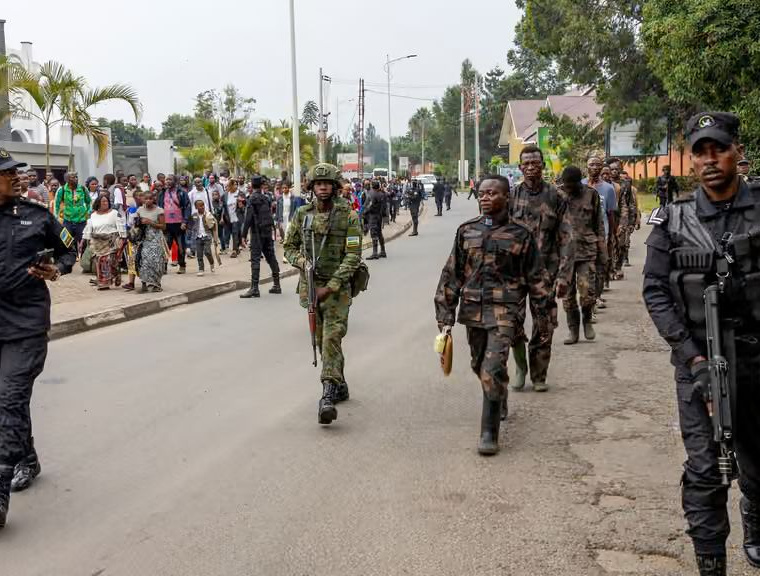
Between 12 September and 7 October 2022, the UN Special Rapporteur for the negative impact of unilateral coercive measures, presented her findings on the negative impact of coercive economic measures (sanctions) on Zimbabwe to the UN Human Rights Commission, during the United Nations General Assembly (UNGA).
She presented two reports, one UNHRC/51/33 ADD2 on the negative impact of sanctions on Zimbabwe and another, UNHRC/51/33 on Secondary sanctions, civil and criminal penalties for circumvention of sanctions regimes and overcompliance with sanctions.
The two reports are related and interconnected. However, in this write up, we will focus on the report UNHRC 51/33/ADD2 on the negative impact of sanctions on Zimbabwe. The write up, will also offer a light appraisal of the Special Rapporteur’s report in areas the report was deficient.
The report on the negative impact of sanctions on Zimbabwe, comes as part of the Human Rights Council’s 51st meeting, which seeks to promote the protection of civil, political, economic, social and cultural rights enshrined in the human rights treaties of ICCPR (International Covenant on Civil, Political Rights) and the ICESCR (International Covenant on the Economic, Social and Cultural Rights).
The basis of the report was focused on the twelve months the UN Human Rights Council spent undertaking primary and secondary research on the negative impact of unilateral sanctions on the enjoyment of human rights in Zimbabwe.
This final report uses less damning language than the preliminary observations made by the UN Special Rapporteur, Alena Douhan, on the 28th of October 2021. In many ways, it is more accommodating, diplomatic and conciliatory than the preliminary report that was a scathing indictment of those that were imposing sanctions on Zimbabwe.
In her findings, she concluded that the unilateral sanctions on Zimbabwe, alongside overcompliance, are contrary to international law and have denied Zimbabweans the enjoyment of their human rights, thus they must be removed in line with the rule of law.
She also clarifies that direct sanctions, secondary sanctions and overcompliance to those sanctions, have affected the government of Zimbabwe, the critical function of the state, State Owned Enterprises, the economy, banks, financial institutions, industry, agriculture and even non-governmental organisations, preventing them from operating optimally.
Sadly, even though sanctions are mass persecution of over 15 million Zimbabwean civilians, the report fell short of calling the illegal sanctions on Zimbabweans, crimes against humanity that have caused deaths and suffering among Zimbabweans.
We believe that the reason the report failed to reach such a conclusion, is because it makes an error in identifying the direct sanctions upon the country as you will see further in the summary.
The report is broken down into sections with the first section below being dedicated to defining the sanctions.
Sanctions On Zimbabwe.
The Zimbabwe Democracy and Economic Recovery Act (ZDERA) is identified as the first set of sanctions imposed on the country in 2001. Here the UN Human Rights Council identifies these sanctions as measures by which the United States government prevents any international multilateral lending institutions from lending money to the Zimbabwean government or cancelling its international debts.
From here, it goes to March 2003, when the United States augmented ZDERA by declaring a national emergency upon 77 individuals who were immediately put under executive order sanctions, EO13288.
It says the same executive orders were extended in 2005 and then again in July 2008. Missing from the special rapporteur’s acknowledgment of these executive order sanctions, is the fact that these measures were extended at intervals related to upcoming elections or periods just after elections in Zimbabwe, to manipulate election outcomes and bring the democratic change (regime change) advocated in
ZDERA’s S494 purpose statement.
For example, ZDERA was imposed 9 months after MDC lost parliamentary elections to ZANU PF, in 2000. Additionally, the first executive order sanctions, EO13288, were imposed after Mugabe was re-elected President in the 2002 Presidential elections, while the executive orders EO13469 were levied 32 days after the 27th June 2008 run-off Presidential elections that happened five days after Morgan Tsvangirai decided to pull out of those elections and lost to Mugabe.
The report then proceeds to outline the February 2002 European Union sanctions, which were on 77 individuals, who were soon also put on US executive orders the following year in 2003. These were then extended in 2004 February and then again in 2011 where they peaked at 163 individuals and entities.
Continuing with the report, it says that in March 2013, the EU suspended most of its sanctions on Zimbabwe, until it totally eliminated them in 2020.
This conclusion by the Special Rapporteur is erroneous, because even after 2020, the EU maintained an arms embargo on the government of Zimbabwe and sanctions on the Zimbabwe Defence Industries (ZDI).
Additionally, in February 2021, the European Union imposed four more sanctions on four government officials it claimed had been responsible for killing innocent civilians in riots in August 2018 and January 2019.
Dramatically, twelve months after imposing these sanctions on the four officials, in the February 2022 sanctions review, the bloc removed the very same sanctions that they had imposed on the officials a year earlier.
It would seem that the Special Rapporteur’s conclusion in her October 28th, 2021, preliminary report on the negative impact of sanctions on Zimbabwe, that the so-called targeted sanctions on these individuals, were lacking in due process, possibly compelled the EU to remove these illegal sanctions that they had imposed on those individuals without trial.
The report also speaks to Swiss and Australian sanctions, which both nations apparently removed in 2020. As far as our research goes, both Switzerland and Australia still have arms embargoes on the government of Zimbabwe, sanctions on ZDI and travel bans on some politicians. We also understand that they accede to sanctions by the other western nations.
What is also missing from the Special Rapporteur’s report, is the fact that in 2018, Donald Trump amended the ZDERA sanctions into S2779, and in that amendment, he added the EU, UK, Canada and Australia as parties that the U.S. government would negotiate with to implement ZDERA.
This essentially means that even though the EU, Canada and Australia have essentially removed direct sanctions on Zimbabwe, outside the arms embargoes on the government and sanctions on ZDI, they continue to implement sanctions indirectly through voting with the United States in multilateral lending institutions, to deny the Zimbabwean government, its parastatals and municipalities loans.
Secondary Sanctions and Overcompliance.
In this section on sanctions, the report also speaks to third parties fearing secondary sanctions, penalties, criminal and civil prosecution, which compels them to over comply with illegal sanctions thus adding another layer of sanctions known as overcompliance.
Among the biggest implementors of overcompliance, according to the report, are banks, software companies, tool manufacturers, manufacturers of fertilisers, chemicals, parts and reagents. This has exacerbated the sanctions even more on Zimbabwe.
In the report on secondary sanctions and overcompliance, the Special Rapporteur suggests that the United States is possibly leaving its sanctions vague, to encourage overcompliance as a means to increase the impact of sanctions and to extend their extraterritorial reach outside the direct sanctions.
Overcompliance are sanctions implemented by third parties to avoid being penalized or prosecuted criminally for not implementing sanctions imposed by the U.S, EU, UK, Australia and or Canada. However, the only problem is the report speaks of overcompliance before adequately identifying the direct sanctions on Zimbabwe. This in turn creates the impression that the sanctions affecting civilians in Zimbabwe are only overcompliance and not direct sanctions upon civilians.
Notwithstanding, executive orders EO13469 explicitly outline that they target 144 individuals, business people, parastatals, companies and financial institutions; anyone trading with the targeted 144 individuals, but as you continue reading the document, it expressly prohibits anyone from doing business with the government of Zimbabwe, companies owned by the government of Zimbabwe and anyone who does business with them or else those trading with the above, stand the risk of suffering secondary sanctions, criminal or civil prosecution or confiscation of assets.
This means that the direct sanctions on Zimbabwe are on 144 so called targets, but as the prohibition clearly states, they also directly prohibit anyone from doing business with the government of Zimbabwe, companies owned by the government of Zimbabwe, local government and those that do business with them.
These are not secondary sanctions or over compliance but they are direct and expressed sanctions on the Zimbabwean government and therefore the Zimbabwean people as a whole, a point not fully acknowledged in the UN Human Rights Council report.
This is a material omission of facts which definitely influenced the definition of the nature of crime being perpetrated upon Zimbabweans, the conclusions of the report and remedies recommended by the report.
Impact of Sanctions on Zimbabwe’s General Economy.
The next thrust of the report is on the analysis of the impact of sanctions to the general economy, enjoyment of human rights, humanitarian impact, access to food, access to water, sanitation, healthcare, education, migration and refugees, employment and critical infrastructure.
In the findings, the overall economy has been greatly affected by sanctions which were compounded by the Economic Structural Adjustment Programme (ESAP) that greatly sapped the Zimbabwean economy before sanctions. The effects of ESAP are followed by climate change and a series of droughts experienced by the country at a time the government did not have the fiscal tools to mitigate the droughts as it did in previous droughts before sanctions.
The sanctions especially had their biggest impact on the Zimbabwean economy between 2001 and 2008 when multilateral lending institutions withdrew their assistance to Zimbabwe and western foreign investment divested from the country. Concomitantly, the economy contracted by 17% and the trade deficit fell by 23%, this after trade had increased by 1.44% in 2000, the same year in which the country had a trade surplus of $155 million.
Inflation moved from 50% in 2000 to 560% in 2003 and then rocketed to 280 million % in the following five years. Exports to the UK and the United States fell and an estimated 680 000 formal jobs in manufacturing, agriculture, tourism and critical services, were lost between 2005 and 2019, growing the informal sector to 94% by 2014. Since then, this informal sector has retracted to 75,6% in 2019.
Estimates are that Zimbabwe lost in excess of $42 billion in revenue between 2001 and 2019, while GDP fell by 35%. This in turn caused a contraction of public services with the health budget falling from 10.8% of GDP down to between 7-8% of a GDP that was 35% smaller.
This was a catastrophic fall, well below the WHO target of 15% set in the Abuja Declaration.
The sanctions, overcompliance, lack of revenue and loans are said to also be denying the government its ability to offer essential services and the ability to provide a social cushion to mitigate the droughts being faced by the country.
Access To Health.
In the 1990s, 88% of Zimbabweans had access to healthcare. This number has been drastically reduced as polyclinics and rural hospitals that offered most of the healthcare services to Zimbabweans, are operating on less capacity and the government has failed to build new infrastructure since sanctions began.
Due to the government not having money, we have seen an increase in vacancies in the medical fraternity, with vacancies of up to 61% for doctors, 80% for midwives, 62% nursing tutors, 63% medical lecturers and 50% for other health professionals who have been leaving the country as brain drain increases due to inadequate salaries in the country.
Infant mortality has increased from 57% in 1995 to 60% in 2009 and 89% in 2014. The same is the case with maternal deaths which between 2000 and 2010 saw the highest maternal deaths of 686 for every 100 000 births. This then increased further to a peak of 960, in 2011 to then come down to 614 in 2014.
According to the United Nations’ Sustainable Development Goals (SDGs), Zimbabwe is well behind the target of 70 maternal deaths per every 100 000 births by 2030.
Life expectancy thus fell from 63 years in 1988 to 43 years in 2006 and now it has improved to 61 years in 2019. WHO reported that in 2002, 67% of essential drugs on the essential list of medicines were not available. In 2008, there was a further reduction of those by another 36%, due to the lack of foreign currency and high inflation.
These essential drugs continue to be in short supply, as by 2014, only 42% of essential drugs remained in hospitals, the most scarce of these essential drugs being antibiotics that remain least accessible.
Access To Education.
Access to education has also been drastically affected as the report indicates that Zimbabwe saw a 7% reduction in primary school completion, from 72% in 2000 to 68% in 2006. And the reason most students give for dropping out of school is lack of funds for transport and school.
Nevertheless, the government has increased social support to 15 000 poor students by increasing school fees upon those who can afford.
The increased fees were also used to fund the school feeding program to aid extremely poor families that are food insecure.
Many teachers have stopped going to class because they cannot afford the transport to go to work on the low salaries they earn. Some teachers and university students have also been unable to participate in international training programs or paying fees to get course material from international institutions, due to sanctions which have affected the rights of the students and teachers to improve themselves.
Critical Infrastructure.
On critical infrastructure, the National Railways of Zimbabwe (NRZ) is unable to get spare parts for its trains and railway infrastructure which were mainly acquired from General Motors in America before sanctions. This has seen a deterioration of the NRZ fleet, lines, signalling systems, repair workshops and training facilities, resulting in the loss of over 5700 jobs. This has reduced rail loads from 12 million tons to 2.5 million tons today.
The report says the parastatal has also struggled to get loans even though it is not directly on the sanctions list, but as we indicated with EO13469 sanctions, all government owned companies in Zimbabwe are under direct sanctions as companies are prohibited from transacting with them without license from the U.S. President.
Suffice to say, the brain drain has taken its toll on the institution as it has lost a lot of skilled talent to the British, Australian, and Canadian railway networks.
Electricity.
On electricity generation, Zimbabwe has the need for 2300MW. It has generation capacity of 2000MW but is currently producing only 1200 MW as a lot of the plant and machinery is old and has not been replaced for years because of the lack of finance and the fact that western companies that provided the machinery, will not provide parts or replacement machines while Zimbabwe is under sanctions.
Humanitarian.
In the humanitarian arena, many non-governmental organizations have stopped operating in Zimbabwe, while donor funds have been reduced to humanitarian organizations due to donors and donor governments reducing their donations to healthcare, education, environmental conservation and other areas as a result of the sanctions and banks blocking payments to some of these institutions.
Even where there have been environmental disasters like cyclone Idai, climate change and COVID, Zimbabwe has not received much support from the international community.
Sanctions have decimated the economy to a point where people have been denied their basic rights to life, food, healthcare, clean water, sanitation and development due to lack of loans, investment and taxes.
Accordingly, the report articulates how many Zimbabweans have been displaced into being refugees in neighbouring countries where some Zimbabwean women have resorted to sex work and the men have gone into criminality.
Access To Food.
Poverty has increased from 26% to almost 50% in 2020, while food insecurity increased from 29% in 1995 to 58% in 2003. By 2016 it was 42% and now more than 60% in 2020. This has seen malnutrition increasing among children and anaemia growing to 33% in pregnant women.
In agricultural production, there was a steep reduction in agricultural yield between 2000 and 2008, all the way through to 2016. During this period, Zimbabwe suffered a reduction in the yield of maize, millet, wheat and other staple food crops while tobacco has grown at the detriment of the environment and food security.
Nonetheless, food crops have rebounded between 2017 and 2022, as Zimbabwe is expecting its biggest harvest of wheat in history this season. In all this, droughts and climate change have not done Zimbabwe any favours.
Sanctions have made retooling, the purchase of reagents, chemicals and machines in agriculture, very difficult as there are no loans or financial assistance to farmers from government and the banking sector which is also suffering under sanctions.
Zimbabwe needs 40 000 tractors, however, at the present moment, it only has 6000. Alongside that the country is also suffering from shortages of vaccines and medicines for animals which has seen a number of animals dying from animal diseases.
As we speak, only 260 000 hectares of land is under irrigation due to a lack of irrigation equipment, maintenance of old equipment and replacement of old machines.
Since the United States imposed sanctions on Belarus, it has become difficult for Zimbabwe to acquire fertilizers, particularly potash, which was coming from that country. With US sanctions on both Belarus and Zimbabwe, logistics between the two countries have become very difficult, thus impacting Zimbabwe.
Access To Water and Sanitation.
Access to water has been very difficult, and in fact, less people have access to clean water today, with only 29.5% accessing clean water in 2020, unlike 32% in 2002. In fact, the lack of access to clean water has seen the number of cases of cholera and typhoid increasing, causing the deaths of over 3000 people, especially between 2007 and 2008.
In urban areas, 97% of the people lack access to improved sources of clean water, whereas 67.9% in rural areas lack access to improved sources of clean water and 25% of the population still lack access to toilets. The lack of water is also associated with more than 70% of factories in Bulawayo closing their doors. Nevertheless, with the government having launched the Gwayi Shangani Dam project, this crisis is about to come to an end.
The existence of sanctions on government municipalities and parastatals has seen government failing to replace water pipes, upgrade the equipment and improve water purification capacity which is depriving the people the right to clean water.
This same lack of financial resources has also seen government fail to upgrade courts, ITC infrastructure and crime fighting technology. The government has also struggled to employ judges, lawyers, prosecutors and skilled people to help in crime fighting and this has seen robberies, drugs, theft and smuggling increasing from 149 834 reports between 1987 and 1999, to 378 474 between 2011 and 2020.
This is a summary of the impact of sanctions that are on Zimbabwe, according to the UN Human Rights Council’s 2022 UNHRC51/33 Add2 report.
Recommendations.
The report recommends that countries imposing or implementing sanctions that are contrary to international law and human rights law, desist from imposing these sanctions and begin negotiations with Zimbabwe to remove the illegal sanctions.
She also encourages nations to observe international law, human rights law and international customs including sovereign equality, political independence, non-intervention in the domestic affairs of sovereign nations and peaceful settlement of international disputes.
She urges the United States to adhere to international law and to align its domestic laws with international law, human rights law, refugee laws and international responsibility.
She also enjoins the same government to stop using its currency as a means to exert its sanctions extraterritorially.
Unlike her report on the negative impact of sanctions, UNHRC 51/33 which was on secondary sanctions and over compliance, goes as far as recommending that nations must create legislation to stop their companies and private institutions from over complying with illegal sanctions or imposing unilateral coercive measures on other countries.
We feel that the report was a pretty fair report even though it was lacking in tenacity and intent. We particularly feel that it did not go far enough in creating a deterrent for sanctions by not recommending that countries facing sanctions pursue legal action for damages, reparations and compensation in the World Trade Organisation, the International Court of Justice, regional courts and national courts, against sanctions senders, those that implement illegal sanctions and those that call for illegal sanctions as UNHRC Resolution 34/13 enjoins.
Finally, we believe that the sanctions on Zimbabwe have been deliberately levied on the government and thus are indiscriminate, disproportionate and unreasonable collective punishment of civilians. In other words, the U.S, E.U and U.K sanctions on Zimbabwe are persecution of civilians by depriving them the right to life, food, water, employment, healthcare, education, social services, development and other basic rights, for political reasons. This makes these sanctions crimes against humanity.
By Rutendo Bereza Matinyarare, Chairman of ZASM and Founder of Frontline Strat Marketing Consultancy.




